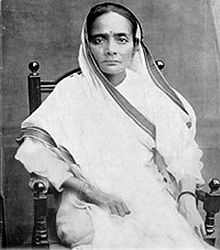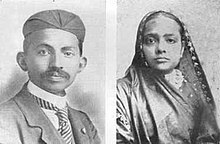User:Ans9953/sandbox
This article has multiple issues. Please help improve it or discuss these issues on the talk page. (Learn how and when to remove these messages)
|
Kasturbai Mohandas Gandhi | |
|---|---|
| કસ્તુરબાઈ મોહનદાસ ગાંધી | |
 | |
| Born | Kasturbai Makhanji Kapadia 11 April 1869 Porbandar, Porbandar State, Kathiawar Agency, Bombay Presidency, British India (present-day Gujarat, India) |
| Died | 22 February 1944 (aged 74) |
| Other names | Kasturba Mohandas Gandhi |
| Occupation | Activist |
| Spouse | |
| Children | |

Kasturbai "Kasturba" Mohandas Gandhi (born Kasturbai Makhanji Kapadia on 11 April 1869 – 22 February 1944) was a political activist and the wife of Mohandas Karamchand Gandhi. In association with her husband, Kasturba Gandhi was involved in the Indian independence movement in British-ruled India.
Early life and background
[edit]Kasturba was born the daughter of Gokuladas Kapadia and Vrajkunwerba Kapadia. The family belonged to the Modh Bania caste of Gujarati tradesmen and were based in the coastal town of Porbandar.[1] In May 1883, 14-year old Kasturba was married to 13-year old Mohandas Karamchand Gandhi in a marriage arranged by their parents, in the traditional Indian manner.[2] They were married for a total of sixty-two years. [3]Recalling the day of their marriage, her husband once said, "As we didn't know much about marriage, for us it meant only wearing new clothes, eating sweets and playing with relatives." However, as was prevailing tradition, the adolescent bride was to spend the first few years of marriage (until old enough to cohabit with her husband) at her parents' house, and away from her husband.[4] Writing many years later, Mohandas described with regret the lustful feelings he felt for his young bride, "even at school I used to think of her, and the thought of nightfall and our subsequent meeting was ever haunting me."[5] At the beginning of their marriage, Gandhi was also possessive and, manipulative; he wanted the ideal wife who would follow his command. [3]
Kasturba and Gandhi had five sons, with their eldest dying at a young age. Although the proceeding four sons survived to adulthood, Kasturba never truly got over the death of her first newborn.[6] The first two sons were born before Gandhi first went abroad. Later on, in 1906, Gandhi took a vote of chastity, or, brahmacharya [3] Some reports indicate that Kasturba felt that this opposed her role as a traditional Hindu wife. [3] However, Kasturba quickly defended her marriage when a friend suggested she was unhappy. Kasturba's relatives also insisted that the greatest good was to remain and obey her husband, the Mahatma. [3]
When he left to study in London in 1888, she remained in India to raise their newborn son Harilal. The couple later had three more sons: Manilal, Ramdas, and Devdas. Kasturba's relationship with her husband can be described by the following extract from Ramachandra Guha's novel Gandhi Before India; "They had, in the emotional as well as sexual sense, always been true to one another. Perhaps because of their periodic, extended separations, Kasturba deeply cherished their time together."[7]
Political career
[edit]
Kasturba Gandhi first involved herself with politics in South Africa in 1904 when she helped her husband and others establish the Phoenix Settlement near Durban. Then in 1913, she took part in protests against the ill-treatment of Indian immigrants in South Africa, for which she was arrested. While in prison, Kasturba helped the other young women survive by leading them in prayer [8] referring to the prison as the temple during the prayer meetings. Kasturba also referred to these women as sisters. [9] While imprisoned, Kasturba encouraged educated women to teach the uneducated women how to read and write. [9]
Kasturba and Gandhi then permanently left South Africa in July 1914 and returned to live in India. In spite of Kasturba’s chronic bronchitis - that had worsened in South Africa - she continued to take part in civil actions and protests across India that were organized by Gandhi. Moreover, she often took her husband's spot if he was in prison.[8] The majority of her time was dedicated to helping out and serving in ashrams.[10] Here, Kasturba was referred to as "Ba" or Mother, because she served as mother of the ashrams in India. [11] A place of contempt between Kasturba and Gandhi was the treatment of their children versus the treatment of the whole ashram. Gandhi believed that their son did not deserve special treatment, while Kasturba felt that Gandhi neglected them. [12]
In 1917, Kasturba focused on helping improve the welfare of women in Champaran, Bihar where Gandhi was working with indigo farmers. She taught women hygiene, discipline, health, reading and writing. In 1922, Kasturba participated in a Satyagraha (nonviolent resistance) movement in Borsad, Gujarat. Kasturba joined the struggle even though she was in poor help, and was sentenced to hard labor on September 23, 1913. [8] However, she could not take part in Gandhi's famous Salt March in 1930, but continued to take part in many civil disobedience campaigns and marches. As a result, she was arrested and jailed on numerous occasions.[10]
In 1939, Kasturba took part in nonviolent protests against the British rule in Rajkot, after the women in the city specifically asked her to advocate for them.[10] Kasturba was arrested and kept in solitary confinement for a month. Her health worsened but Kasturba continued to fight for independence. In 1942, she was arrested again, along with Gandhi and other freedom fighters for participating in the Quit India movement. She was imprisoned in the Aga Khan Palace in Pune. By this time her health had severely deteriorated completely and she breathed her last at the detention camp in Pune.[6]
Kasturba considered her work above everything and Gandhi wrote about this in his biography, "According to my earlier experience, she was very obstinate. In spite of all my pressure she would do as she wished. This led to short or long periods of estrangement between us. But as my public life expanded, my wife bloomed forth and deliberately lost herself in my work."[13]
Health and death
[edit]


Kasturba suffered from chronic bronchitis due to complications at birth. Her bronchitis was complicated by pneumonia.[14] Kasturba's health later deteriorated in January 1908, as she fasted while Gandhi was in prison, becoming ill. Kasturba came so close to death that Gandhi apologized to her, and promised that he would not remarry if she were to die. [8]
In January 1944, Kasturba suffered two heart attacks after which she was confined to her bed much of the time. Even there she found no respite from pain. Spells of breathlessness interfered with her sleep at night. Yearning for familiar ministrations, Kasturba asked to see an Ayurvedic doctor. After several delays (which Gandhi felt were unconscionable), the government allowed a specialist in traditional Indian medicine to treat her and prescribe treatments. At first she responded, recovering enough by the second week in February to sit on the verandah in a wheel chair for a short periods, and chat. Then came a relapse.
To those who tried to bolster her sagging morale saying "You will get better soon," Kasturba would respond, "No, my time is up". Finally, at 7:35 p.m. (IST) on 22 February 1944, she died at the Aga Khan Palace in Poona, aged 74.[15] The incidents of that day go like this: That morning, her youngest son Devdas came to visit her. He told her that he had brought penicillin, the famous drug discovered by Alexander Fleming, for curing her. But, Mahatma Gandhi prevented his son from injecting. After her death, Mahatma Gandhi quoted that even if he allowed Devdas to inject, his beloved wife would not have survived. She died on the arms of her husband, who outlived her for four years before his assassination.
The Kasturba Gandhi National Memorial Trust Fund was put in her memory. Gandhi requested that this fund would be used to help women and children in villages in India. [16] This fund is for the needy women and children of rural India.
See also
[edit]References
[edit]- ^ Gandhi, Arun and Sunanda (1998). The Forgotten Woman. Huntsville, AR: Zark Mountain Publishers. p. 314. ISBN 1-886940-02-9.
- ^ Mohanty, Rekha (2011). "From Satya to Sadbhavna" (PDF). Orissa Review (January 2011): 45–49. Retrieved 23 February 2012.
- ^ a b c d e Tarlo, Emma (1997). "Married to the Mahatma: The Predicament of Kasturba Gandhi". Women: A Cultural Review. 8 (3): 264–277. doi:10.1080/09574049708578316.
- ^ Gandhi (1940). Chapter "Playing the Husband".
- ^ Gandhi before India. Vintage Books. 4 April 2015. pp. 28–29. ISBN 978-0-385-53230-3.
- ^ a b Gandhi, Arun (14 October 2000). Kasturba: A Life. Penguin UK. ISBN 9780140299717. Retrieved 3 November 2016.
- ^ Guha, Ramachandra (15 October 2014). Gandhi Before India. Penguin UK. ISBN 9789351183228. Retrieved 2 November 2016.
- ^ a b c d Hiralal, Kalpana (2010). "Rethinking Gender and Agency in the Satyagraha Movement of 1913". Journal of Social Sciences. 25 (1–3): 71–80. doi:10.1080/09718923.2010.11892867. S2CID 146792993.
- ^ a b Kapadia, Sita (1989). "Windfall: Tribal Women Come Through". Women's Studies Quarterly. 17 (3/4): 140–149. JSTOR 40003104.
- ^ a b c Routray, Bibhu Prasad. "Kasturba Gandhi: Indian Political Activist". Encyclopædia Britannica. Retrieved 5 November 2016.
- ^ Banerjee, Mita. "Kasturba Gandhi Strength of a Woman." Alive 02 2013: 32-4. ProQuest. Web. 27 Sep. 2017
- ^ Lal, Vinay. [www.sscnet.ucla.edu/southasia/History/Gandhi/Kasturba.html. "Kasturba Gandhi"].
{{cite web}}: Check|url=value (help) - ^ Gandhi, Mohandas Karamchand. My Experiments With Truth: An Autobiography. Jaico Publishing House.
- ^ "Birth Anniversary of Kasturba Mohandas Gandhi". english.dcbooks.com. Retrieved 1 May 2017.
- ^ "Death Takes Gandhi's Wife". Pittsburgh Post-Gazette. 23 February 1944. p. 2. Retrieved 18 May 2017.
- ^ Bhatt, Neela. "The Kasturba Gandhi National Memorial Trust: Plan, Development and Programme of the First Nation-Wide Movement of its Kind for Dealing with the Problem of Women and Children of Rural India". Indian Journal of Social Work. 10: 94–101.
Further reading
[edit]- Gandhi, Arun (2000). Kasturba : a life. New Delhi: Penguin Books. ISBN 0140299718. OCLC 46314502.
- Gupta, Indra (31 December 2010). India's 50 Most Illustrious Women. Icon Publications. ISBN 978-8188086047.
- Nayyar, Sushila (1948). Kasturba, wife of Gandhi. Pendle Hill. ISBN 9780875740003. Retrieved 25 March 2017.
- Thomas, KP (1944). Kasturba Gandhi: A biographical study. Orient Illustrated Weekly. Retrieved 25 March 2017.
External links
[edit]
Category:1869 births Category:1944 deaths Category:Indian pacifists Category:Indian independence activists from Gujarat Category:Gujarati people Category:Indian rebels Category:Hindu pacifists Category:Mahatma Gandhi family Category:Gandhians Category:People from Porbandar Category:Deaths from bronchopneumonia Category:Indian emigrants to South Africa Category:19th-century Indian women Category:20th-century Indian women Category:Women Indian independence activists Category:Women from Gujarat
